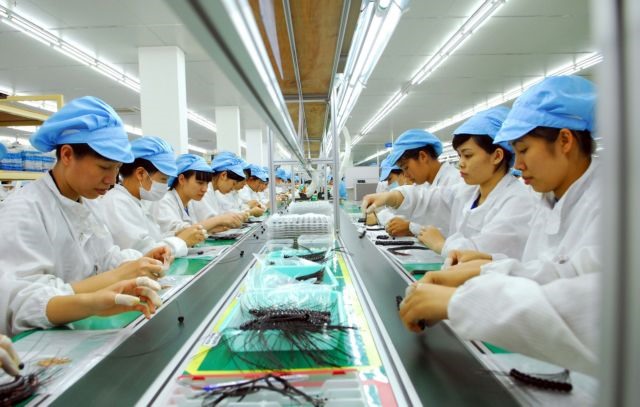 Politics & Law
Politics & Law

Lawmakers at the ongoing National Assembly (NA) meeting on Wednesday are split over discussions about working time and overtime hours capping.

|
Workers of South Korea-invested Bluecom Vina Limited Company in Tràng Duệ Industrial Zone in northern Hải Phòng City. — VNA/VNS Photo Danh Lam
This was the final discussion on the revised Labour Code before the vote on November 20.
Deputy Vũ Tiến Lộc from northern Thái Bình Province said keeping working time set at 48 hours per week is reasonable.
He said Việt Nam’s economic competitors also regulate working hours at 48 per week.
“It is rational to keep Vietnamese working hours the same as other neighbouring countries’ in because Việt Nam has just escaped from being a poor country, become a middle-income country and its productivity has stood at a low level in the region,” he said.
“Cutting down on working time will weaken competitiveness, prevent the country from realising development goals and make it difficult for the country to get out of middle-income trap.”
He said cutting working time also reduces wages and delays wage increases. The current minimum wage approved by the national wage council is based on 48 working hours. If the working time is reduced to between 40 and 44 hours, wages must be recounted.
The NA Standing Committee proposed two options for overtime hours. The first is to increase from 30 to 40 hours per month and add regulations for specific cases allowed to work overtime 300 hours per year.
The second is to increase extra hours from 300 to 400 hours and there is no monthly overtime cap. The Government must continue to study NA deputies’ proposals and prepare a list of jobs allowed to increase extra hours.
Lộc is in favour of increasing total extra working hours to 400 maximum a year, saying that employers and employees can negotiate the amount of time.
Employees in a minority of sectors have the right to accept or refuse overtime during peak seasons, he said.
The current overtime working regulations are not relevant to seasonal sectors. In the fishery sector, shrimp supply is abundant in three to five months. That is when employees work overtime to take advantage of the sources, he said.
Deputy Nguyễn Thị Quyết Tâm from HCM City said the economic competitiveness does not and should not depend on the strength of labourers. It depends on management capacity, technological innovation, working conditions and social progress.

|
Not in favour of increasing extra working time, she said labourers do not want to but they need to work overtime.
“Why do they need to work overtime? Because their current incomes are not enough to live on.”
The NA must study a law that creates conditions for labourers to earn a living to afford their expenses, have time to study, improve skills and spend time for entertainment, families and other social relationships with an aim to realise human’s rights as regulated in the Constitution, she said.
On the sidelines of NA meeting on Wednesday, NA deputy Bùi Sỹ Lợi from central Thanh Hóa Province told Vietnam News Agency that trade unions want to reduce working time from 48 hours to 44 hours per week. But many employees do not want this because it will affect their incomes. There should be assessment and feedbacks from enterprises and labourers.
According to surveys, employers propose the Government map out a timeline so they can prepare for changes, he said.
Giving opinion on rising retirement age, deputy Nguyễn Văn Sơn from central Hà Tĩnh Province proposed those working heavy load and in toxic environment should be allowed to retire ten years earlier than the normal age. The Government should prepare a detailed list of early retirement jobs and submit it to the NA for consideration.
After listening to deputies’ opinions, Minister of Labour, Invalids and Social Affairs Đào Ngọc Dung said the ministry would work with relevant agencies to complete the revised law.
According to NA vice chairwoman Tòng Thị Phóng, the NA will collect opinions of deputies on controversial points of the revised law before it is put on approval next month. —VNS




